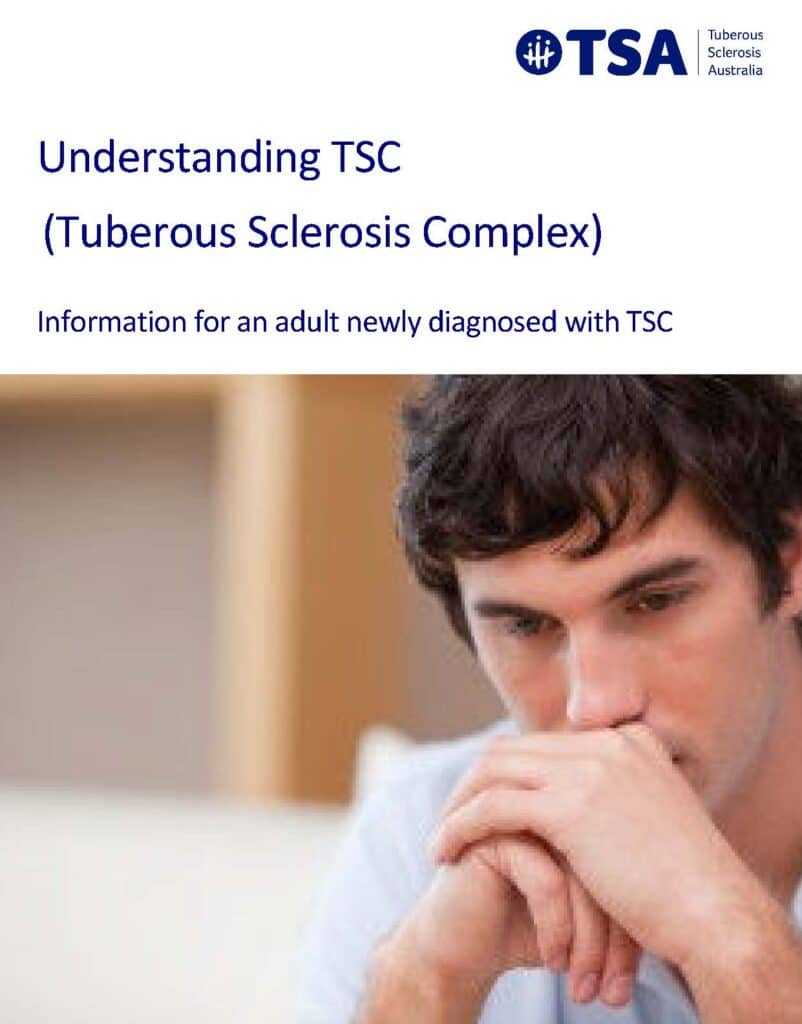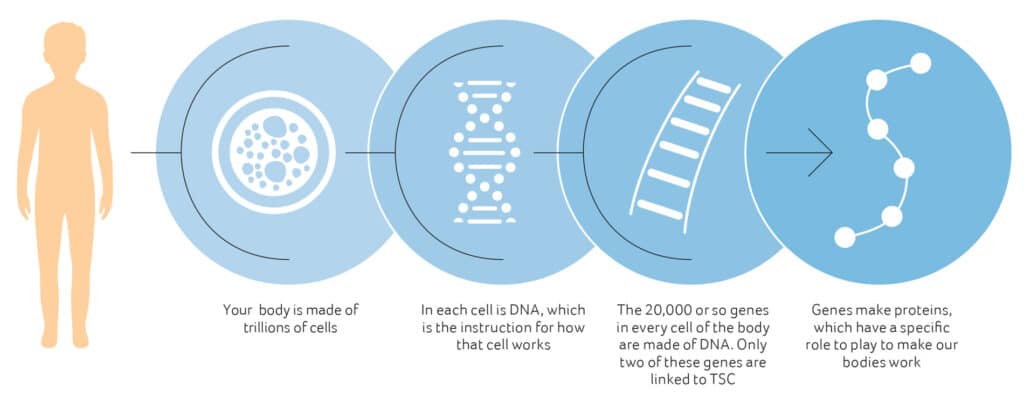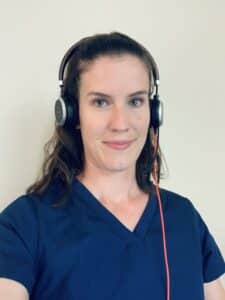
Information for an adult newly diagnosed with TSC
TSC (Tuberous Sclerosis Complex) is a complex disease with some people affected more than others. A diagnosis of TSC can feel daunting but TSA (Tuberous Sclerosis Australia) is here to provide you with support and information to help you navigate this new situation.
This overview provides a brief introduction for adults who are newly diagnosed with the disease. There is much more detailed information about TSC available on the TSA website, but you may find that this overview is enough for the time being. This overview is available below, and as a downloadable, print-at-home pdf (please fill out the form).
We sincerely hope that this information will help you through this difficult time.
Information for adults newly diagnosed with TSC
You may be feeling worried and anxious about your new diagnosis and that is perfectly normal. It can be overwhelming having to learn new terminology and have lots of medical appointments. To have a diagnosis though, means you can now focus on monitoring and treatment. The good news is that recent medical advances have developed more targeted treatments that can change the outcome and management of TSC.
This is only a brief guide to TSC; there is much more detailed information on the TSA website, but you may find that this is enough for the time being.
A diagnosis of TSC can feel daunting but TSA (Tuberous Sclerosis Australia) is here to provide you with support and information to help you navigate this new situation.

That period of time when I was diagnosed was pretty stressful: living with the uncertainty of what this information might say about me, and what it might say about what was going to happen to me in the future. It was also interesting telling other people about it. It was difficult enough for me to cope with it; the last thing I wanted was for friends or family to be freaking out about it. So I drip fed them information about Tuberous Sclerosis. I told certain people a little bit of information; people who I knew better, I would tell them more information.
TSC is a rare disease with an incidence of 1 in 6,000 births or around 1 million people worldwide. It is a genetic disorder that causes benign tumours to develop in many different organs such as the brain, kidney, liver, lungs and skin. TSC affects everyone differently. A new diagnosis of TSC does not mean that you will develop all of the possible symptoms and some issues are more common in children with TSC than adults. For example, cardiac rhabdomyomas (benign tumours in the heart) can occur in babies with TSC, but this is not something that you will develop as an adult.
Being diagnosed as an adult is a quite different experience to the majority of people who have a child who is diagnosed with TSC. I was intelligent enough to understand all of the possible complications of TSC and understand what impact it could have on my life; to know that any day I could have a seizure, or something could develop. Over a period of time I started to think I have lived this long without any problems, so chances are pretty good that I won’t have any problems, so I am not going to worry about it too much, and life goes along.
There are two different ways that TSC can be diagnosed:
1. When a person has signs and symptoms of TSC in their body (clinical diagnosis)
2. When a person has a TSC1 or TSC2 gene change that is known to cause TSC (genetic diagnosis).
TSC is caused by a fault (also known as a mutation) in one of two different genes – TSC1 or TSC2. These genes make proteins which ensure cells only grow as fast as they need to. TSC1 controls the instructions for creating a protein called harmartin whereas TSC2 controls the instructions for a protein called tuberin. If these proteins are not produced correctly, some cells can grow in an uncontrolled way resulting in the tumours seen in people with TSC.
Genes make proteins

In about 30% of cases TSC is inherited from an affected parent. This means up to 70% of individuals with TSC will be the first in the family with the condition. In these people there is a mutation in one copy of TSC1 or TSC2 that arises by chance as a new change at conception. This is called a spontaneous mutation. For some people, it is a gene change which occurs after conception, not at conception, resulting in one cell line carrying a mutation within the TSC1 or TSC2 gene and another cell line which does not, resulting in different cell lines, much like a mosaic artwork, hence the name mosaicism.
Most people will live a normal life span, and many will do so without suffering any serious health issues. However, there can be complications that can arise in organs like the kidney, brain and lungs that can be serious if left untreated. Therefore, it is important for all people living with TSC to have regular surveillance (scans of brain, lungs, kidneys and liver and examination of skin) to look for any changes to enable early treatment or advice as appropriate. While TSC doesn’t need to rule your life, or even necessarily change the way you live your life, it is important that you have regular screening to make sure you keep on top of your individual situation. Like any health care issue, monitoring and treating early is the best strategy.
Most days I don’t ever really think too much about Tuberous Sclerosis. I guess it just sits there in the back of my mind. That uncertainty that one day, some more serious symptoms might develop. But I don’t spend too much time worrying about it, because as I said, I’ve lived this long without problems and I just get on with life.

I want to live my life as fully as possible. Despite my TSC and lung issues, I participate in Strongman, a strength sport, which involves lifting heavy weights four times a week and even compete on a local basis.
As each individual with TSC will have different symptoms, treatments depend on your particular symptoms. Some may require little or no treatment, apart from surveillance appointments. For others, they may require treatment for complications of TSC symptoms such as seizures, kidney, lung or skin issues. A group of drugs called mTOR inhibitors (oral and topical) are being successfully used to treat some of the TSC related symptoms.

As TSC is a genetic disorder, telling your family may be an important next step as there is a chance they could also have TSC. A genetic counsellor can help provide you with advice about what a diagnosis of tuberous sclerosis can mean for you and your family. They can also help you understand the chance of TSC in your own children or if you are planning on having children as there is up to a 50% chance of them having TSC. To be referred to a genetic counsellor, speak to your specialist or GP.

A new diagnosis of TSC can feel overwhelming. Emotional support may come from your friends, your family and from professionals. You may want to seek support from a psychologist, a counsellor or a support group. Your GP can help you connect to a local psychologist through a mental health plan.
While it can be tempting to ‘google’ everything on TSC and use Facebook as a means of support, remember that TSC is a complicated disease that affects everyone differently, so sometimes it can be difficult to know what you should and should not worry about. TSA has created a guide to using Facebook
We recommend that you speak to your specialist or GP to get the information and support that you need to start a surveillance plan that is right for your individual circumstances.
Remember that TSC is a relatively rare condition, so not all health professionals have accurate and up to date knowledge about it. TSA maintains a list of health professionals in Australia called the TSC Health Care Professionals Network who we know have up to date knowledge about the disease. If you are unsure about whether your doctor has up to date knowledge of TSC, you can provide them with information from TSA and/or talk to the TSA Nurse about getting a referral to a doctor who may be part of TSA’s Health Care Professionals Network.
If you want more information and support contact the TSA Nurse on 1300 733 435 (Australia only) or email at [email protected]
Last updated: 30 January 2023
Prepared by: Kim Kerin-Ayres, Nurse, TSA (Tuberous Sclerosis Australia)
Reviewed by: Dr Zeb Rahman, Adult Neurologist, Westmead Hospital; Dr Bernadette Hanna, Clinical Geneticist, Westmead Hospital
DISCLAIMER
Please note that the information provided in this publication is not medical advice. You should consult your doctor(s) before taking any action based on any information published by TSA.
